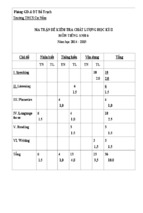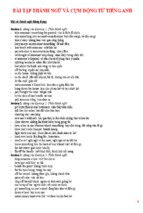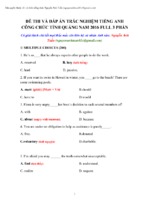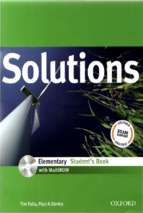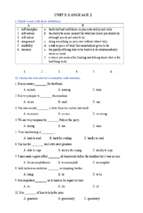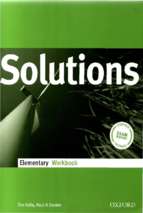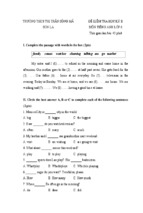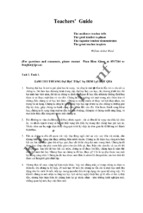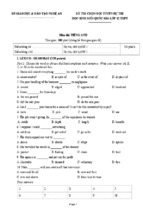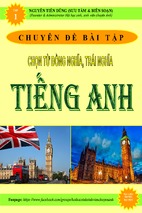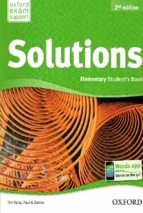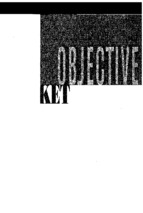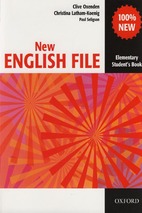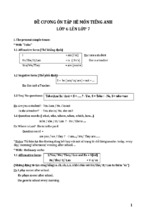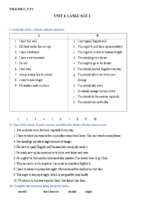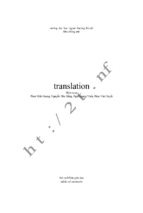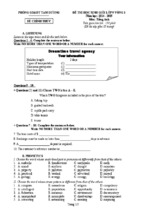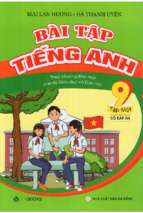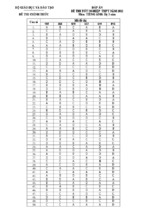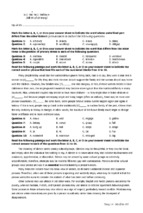Đề cương ôn tập HK II – Lớp 9
GV: Nguyễn Thị Thức
ĐỀ CƯƠNG ÔN TẬP HỌC KỲ II
MÔN :ANH VĂN LỚP 9
I. UNIT 6:
1. Nêu cách thành lập Adverb of manner (Trạng từ chỉ thể cách,mức độ ) từ 1 số tính từ
- Đổi các tính từ sau sang trạng từ : good, bad, slow, extreme, sudden, clear, careless, carefull, late,
early, hard, fast
- Nêu vị trí của tính từ và trạng từ. Lấy ví dụ cho mỗi vị trí của tính từ và trạng từ.
2. Mệnh đề trạng ngữ chỉ lý do ( Adverbs clauses of reason ) bắt đầu bằng những từ nào. Lấy 1 ví dụ
minh họa
3. Viết cấu trúc, cách dùng của câu điều kiện loại I (Conditional sentences type I). Lấy 2 ví dụ minh họa
II. UNIT 7:
1. Viết các từ nối( Connectives). Lấy mỗi từ nối 1 ví dụ minh họa
2. Viết các phrasal verbs ( Động từ kép ). Có ví dụ minh họa cụ thể
3. Viết các cấu trúc câu đề nghị (Suggestions) và cấu trúc đáp lại câu đề nghị . Lấy 3 ví dụ .
III. UNIT 8:
1. Có mấy loại mệnh đề quan hệ (Relative clauses)? Đó là những loại nào? Có những đại từ quan hệ
nào? Lấy mỗi đại từ một ví dụ.
2. Mệnh đề trạng ngữ chỉ sự đối lập ( Adverb clauses of concession ) bắt đầu bằng những từ nào? Lấy 2
ví dụ minh họa
IV. UNIT 9:
1. “That” dùng thay thế cho “ Who, whom, which” trong những trường hợp nào? Lấy ví dụ cụ thể
V. UNIT 10.
1. Cách dùng của Modals “May /Might”. Viết 2 ví dụ minh họa
2. Viết cấu trúc, cách dùng của câu điều kiện loại II. Lấy 2 ví dụ minh họa.
* Ôn lại bài viết, từ vựng từ unit 6 đến unit 10
* Tự lập bảng động từ bất quy tắc.
Đề cương ôn tập HK II – Lớp 9
GV: Nguyễn Thị Thức
PHẦN LÝ THUYẾT
A. Vocabulary
UNIT 6
- environment : môi trường
- dynamite : thuốc nổ
- deforestation: chặt phá rừng
- spoil: làm hỏng
- happen : xảy ra
- plastic bag: túi ny lông
pollution: sự ô nhiễm
spray : phun, xịt
provide: cung cấp
walk along: đi dọc theo
banana leaves: lá chuối
dissolve: phân hủy
garbage dump : bãi rác
pesticide: thuốc sâu
disappointed: thất vọng
achieve: đạt được.
wrap : gói, bao
natural resources: tài nguyên t.nhiên
- save: tiết kiệm
harm: có hại, làm hại
garbage bin: thùng rác
- prevent: ngăn chặn
throw : vứt, ném
instead of: thay cho, thay vì
- reduce : giảm
reuse: sử dụng lại
recycle: tái chế
- amount: khối lượng
litter: xả rác
- divided into : chia thành, chia làm
make + O + V-inf / N –phrase: làm cho ai, cái gì như thế nào đó
- junk –yard: bãi phế thải
treasure = precious things : vật quý, của quý
cover: bao phủ
- hedge: hàng rào
take ..home: đem… về nhà
minimize: giảm thiểu
- catch fish : bắt cá
prohibit: cấm
fine: phạt
UNIT 7
- water bill : hóa đơn tiền nước
enormous = huge : to lớn
plumber ; thợ sửa ống nước
- crack : vết nứt
water pipe : ống nước
twice as much as : nhiều gấp 2 lần
- suggest: đề nghị
take shower: tắm vòi sen
turn off : tắt
- faucet : vòi nước
waste : lãng phí
dripping faucet ; vòi nước bị rỉ
- give so advice : đưa ai lời khuyên
check: kiểm tra
tool : dụng cụ
- solar energy : năng lượng mặt trời
fresh water: nước sạch
go away: đi xa
- cloudy day: ngày có mây
heat: sưởi ấm
effective: có hiệu quả
- install : cài đặt
store: dự trữ
lose : mất
- necessity : sự cần thiết
luxury : sự xa xỉ
consumer : người tiêu dùng
- product: sản phẩm
save money: tiết kiệm tiền
account for: chiếm mức
- replace: thay thế
rule: qui tắc, điều
chore: việc nhà
- a quarter: 1 phần 4
standard : chuẩn
last eight times longer: tuổi thọ gấp 8 lần
- label:dán nhãn
scheme = plan: kế hoạch
appliance ; thiết bị
- category: loại, hạng
innovateion: sự đổi mới
conserve : bảo tồn
- earth : trái đất
hobby : sở thích
however: tuy nhiên
- pay: trả tiền
turn on : bật lên , mở lên
go on: tiếp tục
- purpose = aim : mục đích
shortage: sự thiếu hụt
decade: thập kỉ
- give detail: đưa ra chi tiết
easy – to – understand: dễ hiểu speech: bài diễn văn, thuyết trình
- sum up : tổng kết lại
look after : trông coi, chăm sóc raise money: quyên góp tiền
- therefore: vì thế, vì vậy
to be interested in : quan tâm đến
- look for = find: tìm
nuclear power : năng lượng hạt nhân
- look up: tra từ điển
get people’s attention: thu hút sự chú ý của mọi người
- war invalid: thương binh
sheet with single printed : giấy mới in 1 mặt
- ordinary ; bình thường
energy –saving bulb: bóng đèn tiết kiệm năng lượng
- spend less on lighting: tốn ít tiền hơn cho việc thắp sáng
- solar panel: tấm kim loại tiếp nhận năng lượng mặt trời
UNIT 8
- celebration: dịp kỷ niệm
easter: lễ Phục sinh
Christmas: Nô –en
- Lunar new Year: tết nguyên đán
wedding: đám cưới
Mid –Fall festival: trung thu
- throughout the year: suốt cả năm
decorate: trang trí, trang hoàng sticky rice cake: bánh chưng
- live apart: sống ở xa
Jewish people : người Do Thái ancient: cổ xưa
- Passover: lễ quá hải
to be together at tet: Xum họp ngày tết
- joyful : vui vẻ
crowd: tập trung, tụ tập
parade: cuộc diễu hành
- congratulate : chúc mừng
win / won the first prize: đạt giải nhất
- active: năng động
charity activity: hoạt động từ thiện
- take part in: tham gia
nominate : vinh danh
activist: người hoạt động
- express: bày tỏ,biểu lộ
feeling: tình cảm
memory:kí ức
- opinion = idea: ý kiến
lose heart: nản lòng
describe: miêu tả
- tears: nước mắt
hug: ôm ( khi chào nhau)
considerate: ân cần, chu đáo
- generous: rộng lượng
priority: sự ưu tiên
sense of humor: khiếu hài hước
- humorous: hài hước
distinguish: phân biệt với
different from: khác với
- to be proud of: tự hào về
alive: còn sống
dead: đã chết
Đề cương ôn tập HK II – Lớp 9
GV: Nguyễn Thị Thức
- enhance: tăng cường
tradition: truyền thống
offer: đưa ra, mời
- serve: phục vụ
support: ủng hộ
nationwide: toàn quốc
- gift = present: món quà
compose: biên soạn
cultural house: nhà văn hóa
- public holiday: ngày lễ
satisfied: hài lòng
preparation: sự chuẩn bị
- plenty of = many / much: nhiều
understand: hiểu
as much as: nhiều như
- due to: liên quan đến/ do
traffic jam: kẹt xe
weather bureau: văn phòng dự báo thời tiết
- keyboard: bàn phím ( máy tính)
although / even though/ though: mặc dù
- freedom from slavery: thoát khỏi ách nô lệ
- English speaking contest: cuộc thi nói tiếng Anh
UNIT 9
- natural disaster: thảm họa thiên nhiên snowstorm: bão tuyết
earthquake: động đất
- volcano: núi lửa
typhoon: bão nhiệt đới
weather forecast: dự báo thời tiết
- turn up: mở lớn ( âm thanh)
temperature: nhiệt độ
coast : bờ biển
- bring along: đem theo
just in case: đề phòng
trust: tin tưởng
- miss: bỏ lở
laugh at: cười chế nhạo
candle: nến
- match: diêm
hire: thuê
bucket: cái xô
- ladder: cái thang
blanket: chăn, mền
fix: sửa chữa
- leak: lỗ thủng
roof: mái nhà
tie: cột, buộc
- peg: cọc gỗ
rope: dây thừng
latch: then / chốt cửa
- available: sẵn có
power cut: cắt điện
damage: hư hỏng
- fall down: ngã, đổ
roller: con lăn
expert: chuyên gia
- office block: tòa văn phòng
highway: đường quốc lộ
collapse: sụp đổ
- tidal wave: sóng thần
abrupt: đột ngột
shift: sự dịch chuyển
- tropical: nhiệt đới
predict: dự đoán
erupt: phun trào
- save: cứ sống
warn: cảnh báo
tornado: lốc xoáy
- funnel –shaped: có hình phễu
storm: cơn bão
suck up: hút lên
- path: đường đi
lift: nhấc bổng
baby carriage: xe nôi
- severe: khốc liệt
majority = most of: phần lớn
behave: cư xử, đối xử
- strange: kì lạ
gather: tập trung lại
shelter: chỗ ẩn nấp
- strong wind: gió mạnh
heavy rain: mưa to
glad= happy: vui mừng
- horn: sừng
snout: mũi, mõm
explorer: nhà thám hiểm
- discover: khám phá
planet: hành tinh
thunderstorm: mưa kèm sấm chớp
- chew: nhai
swallow: nuốt
choose to be the logo: chọn làm biểu tượng
- capital city: thủ đô
snow: tuyết
sweep / swept: quét
- Richter scale: độ Rích-te
measure: đo
destroy: phá hủy
- completely: hoàn toàn
homeless: vô gia cư
disastrous: thảm khốc
- cause: gây ra
extensive: rộng lớn
dangerous: nguy hiểm
- tail: cái đuôi
central highlands: cao nguyên miền trung
- strike / struck : đánh vào
a large number of: 1 số lượng lớn
- expect: mong đợi
animal: động vật
Pacific Rim: vành đai Thái Bình Dương
UNIT 10
- another planet: hành tinh khác
exist: tồn tại
flying object: vật thể bay
- report: tường thuật, báo cáo
sky: bầu trời
believe: tin
- spacecraft: tàu vũ trụ
scientist: nhà khoa học
meteor=falling star, shooting star:sao băng
- evidence: bằng chứng
round: hình tròn
object: vật thể
- to the left: về bên trái
sight : nhìn thấy
alien: người ngoài hành tinh
- claim: tuyên bố
egg-shaped: hình quả trứng
soil sample: mẫu đất
- capture: bị bắt
examine: khám
freed: thả ra
- disappear: biến mất
pilot: phi công
plane= aircraft: máy bay
- plate – like: giống hình cái đĩa
device: thiết bị
treetop: ngọn cây
- mistake: hiểu nhầm
worldwide: khắp thế giới
prisoner: tù nhân
- Mars: sao Hỏa
guess; đoán
match: ghép
- mineral: sinh vật
plant: cây trồng
gemstone = precious stone: đá quí
- microorganism: vi sinh vật
spot:điểm, chấm
trace: dấu vết
- sound: âm thanh
low: thấp
hole: hố, lỗ
- weight: cân nặng
jump: nhảy
last: kéo dài
- push –ups: hít đất
orbit: quĩ đạo
space trip: du hành vũ trụ
- imagination: sự tưởng tượng
entertainment: sự giải trí
persuade: thuyết phục
- trick: lừa
landing: đáp xuống
articles: bài báo
- appearance: sự xuất hiện
photographer: thợ chụp hình
man – like: giống như người
- get out of: bước ra khỏi
mysterious: bí ẩn
no longer: không lâu nữa
- real: có thật
welcome: chào đón
drawing: hình vẽ
Đề cương ôn tập HK II – Lớp 9
- space – tourist: khách du lịch vũ trụ
GV: Nguyễn Thị Thức
balloon: bóng bay, khinh khí cầu
B.Grammar
UNIT 6:
1. Adverb of manner (Trạng từ chỉ thể cách,mức độ )
* Cách thành lập :Tính từ ( Adj) + ly = Adv of manner( Trạng từ chỉ thể cách)
eg: slow ->
slowly ( chậm)
happy ->
happily. ( vui vẻ, hạnh phúc)
Good ->
well. ( tốt, giỏi)
Ngoại lệ : hard, late, fast, early vừa là tính từ vừa là trạng từ
* Vị trí : - Đứng sau tân ngữ của câu. ( Mrs. Nga speaks English quite well)
- Đứng sau động từ thường. ( The old man walked slowly to the park)
- Thường đứng ở cuối câu. ( She sings beautifully)
2. Adverbs clauses of reason ( mệnh đề trạng ngữ chỉ lý do) Since /As / Because : Bởi vì .
Eg: Ba is tired because / since / as he stayed up late watching TV.
3. Conditional sentences- Type 1 ( Câu điều kiện loại 1)
* Cấu trúc :
If clause ( mệnh đề if)
Main clause ( mệnh đề chính)
(+) If + S ( I / you / we / they) + V-infinitive
(+) S + will + V-inf…
If + S( he/ she/ it / tên) + Vs /Ves …
* Thêm “ es” vào sau nếu động từ đó tận cùng là o, x,ch, sh,ss (ví
dụ: go, watch, wash, ..)
(-) If + S (I / you / we / they) + don’t + V- infinitive …
(-) S + won’t + V-inf…
If + S( he/ she/ it / tên) + doesn’t+ V-infinitive.
* Usage : Diễn tả một điều kiện có thể xảy ra ở hiện tại hoặc tương lai.
Eg : If we go on littering, the environment will become seriously polluted.
UNIT 7:
1. Connectives ( Từ nối ):Viết nghĩa tiếng Việt của những từ nối sau:
And: và
But: nhưng
Because / Since/As: Bởi vì
Or: hay là, hoặc là
So: vì thế, vì vậy
Therefore: vì vậy mà (;)
However: Tuy nhiên ( ; )
2. Phrasal verbs ( Động từ kép )
Turn on: mở
Listen to: nghe
Turn off: tắt
Look up:tra cứu
Look for: tìm kiếm
Go on :tiếp tục
Look after:trông coi, chăm sóc
Talk about: nói về
3. Suggestions ( câu đề nghị)
Suggestion
Response
1. I suggest + V-ing ( Tôi đề nghị)
1. OK ( Được thôi)
2. What about + V-ing…? ( Còn …thì sao)
2. That’s a good idea ( ý kiến hay)
3. How about + V-ing…? ( Thế còn …………thì sao)
3. All right. ( Được)
4. Shall we + V-inf ..? ( Chúng ta sẽ)
4. No. I don’t want to. ( Không. Tôi không muốn)
5. Let’s + V-inf… ( Chúng ta hãy)
5. I prefer to…( Tôi thích …hơn)
6. I think we should + V-inf… ( Tôi nghĩ chúng ta nên)
6. Let’s…
7. Why don’t we + V-inf …? ( tại sao chúng ta không)
8. I suggest that + S + should + V-inf ( Toi đề nghị rằng)
UNIT 8:
1. Relative clauses ( mệnh đề quan hệ / mệnh đề tính ngữ):
Mệnh đề quan hệ xác định là mệnh đề dùng để xác định danh từ hoặc đại từ mà người nói muốn nhấn
mạnh đến.
Eg: The teacher who teaches us maths is Mrs. Quynh Hoa.
2. Relative pronouns ( Đại từ quan hệ )
Who : là đại từ quan hệ dùng để thay thế cho danh từ hoặc đại từ chỉ người, làm chủ ngữ trong
mệnh đề quan hệ.
Eg : Tom can compose songs. Tom can sing Western folk songs very well .
Đề cương ôn tập HK II – Lớp 9
GV: Nguyễn Thị Thức
Tom who can sing Western folk songs very well can compose songs.
Whom: là đại từ quan hệ dùng để thay thế cho danh từ hoặc đại từ chỉ người, làm tân ngữ trong
mệnh đề quan hệ
Eg: The girl is my sister. You met her yesterday.
=> The girl whom you met yesterday is my sister.
Which : là đại từ quan hệ dùng để thay thế cho danh từ hoặc đại từ chỉ vật , làm chủ ngữ và làm
tân ngữ trong mệnh đề quan hệ.
Eg : This watch is a gift. The watch was given to me by my aunt on my 14 th birthday.
This watch is a gift which was given to me by my aunt on my 14 th birthday.
That là đại từ quan hệ dùng để thay thế cho who, whom, which trong mệnh đề quan hệ xác định.
Where ( nơi mà ) : thay thế cho cụm từ chỉ nơi chốn. Cụm từ chỉ nơi chốn gồm các giới từ : in, on,
…+ danh từ ( in the school, in the village , in the house, there … )
Eg: I sometimes visit Duc Trong High school. I used to learn there.
=> I sometimes visit Duc Trong High school where I used to learn.
When ( khi mà, thời gian mà) : thay thế cho cụm từ chỉ thời gian ( on that day, in that month, then
…)
Eg: Sunday is a day. I am free on that day.
=> Sunday is a day when I am free.
Whose ( của người mà / của vật mà): thay thế cho các tính từ sở hữu ( his / her / their / name’s ) +
danh từ.
Eg: This is the man. His son is my student.
=> This is the man whose son is my student.
3. Adverb clauses of concession ( mệnh đề trạng ngữ chỉ sự đối lập )
Mệnh đề trạng ngữ chỉ sự đối lập thường được bắt đầu bằng các từ though / although / even though
( mặc dù /Dù cho). Khi nối câu dùng những từ này rồi thì tuyệt đối không thêm từ But nữa
Eg: We went to Ha Noi to watch the parade . We live in Nam Dinh.
ð
We went to Ha Noi to watch parade although we live in Nam Dinh
Or Although we live in Nam Dinh, we went to Ha Noi to watch parade.
UNIT 9:
1. Relative pronouns : who,that, which.( Đại từ quan hệ : Who,that, which)
That là đại từ quan hệ dùng để thay thế cho Who, whom và which nếu danh từ đi trước nó là some /any
+ N, the most / the + adj (est ) + Adj hoặc danh từ chỉ cả người và vật, all.
Eg: The men and animals were from China. You saw them on TV.
=> The men and animals that you saw on TV were from China.
2. Non – defining relative clauses ( mệnh đề quan hệ không xác định) : là loại mệnh đề dùng để cung cấp
thêm thông tin cho danh từ hoặc đại từ đi trước nó, nó có thể được bỏ đi mà không ảnh hưởng gì đến nghĩa
của câu. Mệnh đề quan hệ này thường đứng giữa hai dấu phẩy.
Eg: Viet Nam, which is in South –east Asia , exports rice
V. UNIT 10.
1. Modals :May /Might : động từ đặc biệt : May /Might : Có thể. Có lẽ.
May / might + V-infinitive
=> Dùng để: - dự đoán sự vật, sự việc. ( It might be a meteor : Có thể đó là một ngôi sao băng)
- nói về một khả năng . ( There might be water in Mars : Có khả năng có nước trên sao Hỏa)
- xin phép ( May I go out ? : Thưa cô cho em ra ngoài)
2. Conditional sentences type 2 ( câu điều kiện loại 2)
If clause (mệnh đề If)
Main clause ( mệnh đề chính)
(+) If + S + VII, ed ( be -> were ) + …
(+) S + would / could /should + V-inf…
(-) To be: If + S + were not + …
(-) S+ (would / could /should) not + V-inf…
ĐT thường : if + S + didn’t + V-inf
Dùng để nói về một sự việc, hành động không có thật hoặc không thể xảy ra ở hiện tại .
Eg1: If I (be) were rich, I ( travel) would travel around the world ( Nếu tôi giàu, tôi sẽ đi du lịch khắp trái đất
. Nhưng sự thật là tôi không giàu )
Eg 2: If I ( not stay up ) didn’t stay up late last night, I ( not be ) would not be late for school.
Đề cương ôn tập HK II – Lớp 9
GV: Nguyễn Thị Thức
TỔNG HỢP ĐỀ THI
HK II (2007-2008)
I. Töø vöïng vaø ngöõ phaùp:
1. You should have a /an ……………………to check the water pipes in your bathroom.
a. electrician
b. scientist
c. plumber
d. builder
2. We love our parents very much and want them to be ………………..
a. happiness
b. happy
c. unhappy
d. happily
3. All the things………………… we bought are for the party on New Year’s Eve.
a. that
b. who
c. whom
d. what
o
4. Ho Chi Minh City will …………………………………….temperatures betwwen 25 C and 30o C tomorrow.
a. occur
b. experience
c. achieve
d. arrive
5. Tuan has studied very hard; …………….his English is still not good.
a. however
b. so
c. therefore
d. but
6. Lan : Congratulate you on your success, Nam.
Nam :…………….
a. That’s a good idea
b. That’s very kind of you c. You are welcome d. Well done
7. Ba is an active student. He always takes part …………………………many different charity activities in his
town.
a. from
b. of
c. to
d. in
8. On Women’s Day, we gave our mothers a bunch of flowers ……………..were cut from the garden.
a. who
b. whom
c. which
d. what
9. I suggest……………………posters on energy saving and hanging them around our school.
a. made
b. making
c. make
d. to make
10. Thousands of people were saved…………scientists had warned them about the tidal waves.
a. because
b. but
c. and
d. so
11. We were very…………………………..that no one stopped those people using electricity to catch fish.
a. delighted
b. excited
c. worried
d. pleased
12. ……………………..funnel – shaped storms which pass overland below a thunderstorm.
a. tornadoes
b. Earthquakes
c. hurricanes
d. Typhoons
13. Don’t worry ! Our neighbor will …………the garden when we go on holiday.
a. look up
b. look for
c. look at
d. look after
14. You can decrease the amount of garbage be collecting waste things for recycling.
a. increase
b. raise
c. reduce
d. develop
15. If Jack writes more carefully, he…………………….so many mistakes.
a. wouldn’t make
b. didn’t make
c. doesn’t make
d. won’t make
II. Ñoïc hieåu: Ñoïc kyõ ñoaïn vaên sau vaø choïn phöông aùn ñuùng ( öùng vôùi a, hoaëc b, c, d) cho moãi choã troáng
töø caâu 16 ñeán caâu 23.
Harvest Home is a ( 16) ……………….English harvest festival. The last day of harvest is celebrated
(17) ………………….. singing, shouting, and decorating the village with tree branches. The cailleac, or last
sheaf of corn, (18)…………………………………..represents the spirit of the field, is (19)……………………………into a harvest
doll and drenched with water. It is believed that this will bring ( 20)……………………………….for the next harvest.
The sheaf is saved ( 21)…………………………..spring planting. In ancient times, the (22)…………………………………also
included the symbolic murder of the grain spirit as well as rites for getting rid of the devil. A similar
festival was traditionally (23)……………………………in parts of Ireland, Scotland, and Northern Europe.
16a. tradition
b. traditional
c. traditionally
d. traditionalism
17a. for
b. with
c. in
d. by
18a. what
b. which
c. who
d. that
19a. made
b. making
c. make
d. to make
Đề cương ôn tập HK II – Lớp 9
GV: Nguyễn Thị Thức
20a. flood
b. wind
c. rain
d. drought
21a. in
b. from
c. since
d. until
22a. meeting
b. activity
c. festival
d. culture
23a. held
b. happened
c. taken
d. described
Ñoïc kyõ baøi khoùa sau vaø choïn phöông aùn ñuùng ( öùng vôùi a, hoaëc b, c, d) cho moãi caâu töø 24 ñeán 28
Drought is a condition that becomes when the average rainfall for a fertile area drops far below
the normal amount for a long period of time. In area which are not irritated, the lack of rain causes farm
crops to whither and dead. Higher than normal temperatures usually accompany periods of drought.
They add to the crop damage . Forest fires start easily during drought. The soil of the drought area
becomes dry and crumbles. Often the rich topsoil is blown away by the hot, dry winds. Stream, ponds,
and wells often dry up during a drought, and animals suffer and may even die because of the lack of
water.
24. Drought will happen……………….
a. in the rainy season
b. when it rains heavily
c. when there is not enough rainfall for a fertile area for a long time of period.
d. when rivers are dry
25. The lack of rain causes……………………………………
a. soil to be fertile
b. farm crops to wither and die
c. a good harvest
d. irrigation
26. The temperatures during a drought are………………
a. normal
b. low
c. comfortable
d. high
27. The soil of adrought area…………………..
a. becomes more fertile
b. becomes dry and crumbles.
c. blows away and will never be back.
d. is easy to plow
28. According to the text, which of the following statements is NOT TRUE?
a. People can easily get water from the wells in the period of drought.
b. There are forest fires during droughts.
c. The crop is damaged in areas which are not irregated
d. Animals may die because of the lack of water.
B. Phaàn töï luaän ( 3ñ)
I. Vieát laïi caùc caâu sau ñaây sao cho nghóa cuûa caâu khoâng thay ñoåi (1ñ)
1. The storm destroyed the town completely.
The town…………………………………………………………………………………………………
2. The traffic was bad yesterday. I arrived at the meeting on time.
Although………………………………………………………………………………………………….
3. How about reducing the amount of water we use every day?
Let’s………………………………………………………………………………………………………
4. Mr. John is our English teacher. He comes from Australia.
Mr. John , ………………………………………………………………………………………………...
II. Söû duïng nhöõng töø hoaëc ngöõ gôïi yù sau ñaây ñeå vieát moät laù thö (2ñ)
Dear Nga,
1. I / just / receive / letter / and I fully / agree / you.
2. We / should celebrate/ Father’s Day / as people do / Australia / USA.
3. Children / have/ special day/ express/ feelings, memories and love / fathers.
4. In / opinion / we / celebrate/ this day/ the second Sunday of June.
5. Father’s Day / children / send cards / presents / fathers.
6. They also / have parties / go on picnics.
7. I believe / this idea / be supported / and celebrated / nationwide.
8. I / look forward / hear / you / soon.
Love,
Đề cương ôn tập HK II – Lớp 9
Lien
GV: Nguyễn Thị Thức
ÑEÀ THI HK II ( 2006 - 2007)
Choïn töø / cuïm töø thích hôïp ( öùng vôùi A, hoaëc B,C,D ) ñeå hoaøn thaønh caâu sau:
1. What ……………if you met an alien from outer space ?
A. would you do
B. will you do
C. did you do
D. may you do
2. My mother helped me with my homework, ……………she was tired.
A. as
B. because
C. when
D. although
3. During the summer months the average………………… in Da Lat is 18 degrees C.
A. weather
B. highlands
C. temperature
D. resource
4.Thanh is absent from class today because she has to …………………her sick mother.
A. look at
B. look after
C. look up
D. look out
5. Peter : Let me congratulate you on your nomination, Amy?
Amy: …………
A. That’s a good idea B. Well done
C. Yes, I think so
D. it’s nice of you to say so
6. Banana leaves should ……………………to wrap things instead of plastic bags.
A. be used
B. to be used
C. used
D. use
7. A pilot is a person……………operates the controls of an aircraft.
A. whom
B. whose
C. which
D. who
8. The earth, …………… is the fifth largest planet in the solar system, is the third planet from the sun.
A. who
B. whom
C. which
D. that
9. You will pass your examination if you ……………………hard
A. don’t work
B. work
C. worked
D. didn’t work
10. Sally spoke so………………………… that we didn’t hear her…………………………
A. soft / clear
B. softly / clearly
C. soft / clearly
D. softly / clear
11. The roof……………under the weight of snow.
A. destroyed
B. erupted
C. collapsed
D. covered
12. They ………………the room with flowers and balloons
A. decorated
B. celebrated
C. predicted
D. separated
13. People can know when ………… will erupt nowadays, can’t they ?
A. a typhoon
B. a tornado
C. a volcano
D. an earthquake
14. Nam is studying abroad. I ………………since he left Viet Nam.
A. haven’t seen
B. won’t see
C. don’t see
D. didn’t see
15. My mother enjoys ……………… on weekends.
A. to cook
B. cook
C. cooking
D. cooked
16. A dictionary is a book…………… explains the meanings of words.
A. what
B. who
C. whom
D. that
17. I suggest…………… elderly people with their chores.
A. to help
B. help
C. helping
D. being helped
18. You don’t like sugar, …………………?
A. do you
B. are you
C. can you
D. don’t you
Choïn töø maø phaàn gaïch chaân coù caùch phaùt aâm khaùc vôùi töø coøn laïi :
19. A. installed
B. hoped
C. looked
D. collapsed
20. A. funny
B. deny
C. happy
D. lucky
21 A. which
B. where
C. when
D. who
22. A. pull
B. but
C. cup
D. club
23. A. brushes
B. teaches
C. relaxes
D. goes
Choïn töø (öùng vôùi A, hoaëc B,C,D) coù nghóa töông ñöông vôùi töø gaïch döôùi.
24. They claimed that they were captured by aliens and taken aboard a spacecraft
A. given food
B. caught as prisoners
C. examined carefully. D. taken photos
Choïn caâu (öùng vôùi A, hoaëc B,C,D) töôøng thuaät laïi caâu sau:
25. ‘ Do you understand my question ?” she said to Nam.
a. She asked Nam if he understood her question
b. She asked Nam if she understood his question
c. She said to Nam if he understood her question
d. She told Nam if she understood his question
Choïn caâu (öùng vôùi A, hoaëc B,C,D) dieãn ñaït ñuùng vôùi nhöõng töø gôïi yù sau:
Đề cương ôn tập HK II – Lớp 9
GV: Nguyễn Thị Thức
26. Hung / tired / stayed up / late /play / computer games /
a. Hung tired because he stayed up late playing computer games
b. Hung is tired although he stayed up
late playing computer games
c. Hung is tired because he stayed up late playing computer games d. Hung is tired therefore he stayed up
late playing computer games
27. Mai / person / always / help
a. Mai is a person who is always help me
b. Mai is a person whom always helps me
c. Mai is a person who always helps me
d. Mai is a person whom always helps me
28. problem / must / solve / quick.
a. This problem must solve quickly
b. This problem must be solve quickly
c. This problem must be solved quickly
d. This problem must be solved quick
29. Da Lat /I / visit / last year / beautiful / city.
a. Da Lat, that I visited last year, is a beautiful city
b. Da Lat, where I visited last year, is a beautiful
city
c. Da Lat, which I have visited last year, is a beautiful city d. Da Lat, which I visited last year, is a beautiful
city
30. I/think / we / turn / all lights / before / leave / room.
a. I think we should turn off all the lights before leaving the room b. I think we should turn all the lights off
before leave the room
c. I think we should turn off all the lights before leave the room d. I think we should turn all the lights before
leaving the room
Xaùc ñònh töø / cuïm töø coù gaïch döôùi caàn phaûi söûa, ñeå caâu sau
trôû thaønh chính xaùc:
31. The teacher asked me what my name is and where I came from.
A
B
C
D
32. What are you doing, Lan ? – I am listening to the forecast weather on TV.
B
B
C
D
33. If I am you I wouldn’t behave like that.
A B
C
D
34. How about going to the beach and play volleyball there ?
A B
C D
35. I am pleased that you can speak English very good.
A
B
C
D
Choïn töø thích hôïp ( öùng vôùi A, hoaëc B,C, D ) ñeå ñieàn vaøo choã troáng trong baøi khoùa sau:
Earth Day, Every Day
nd
Earth Day is ( 36) …… April 22 every year. Earth Day is a day to remember ( 37) ………… care of
our planet, Earth. We can take care of our planet by keeping (38) ………… clean. We can keep Earth clean by
following the rule of “ reduce, reuse, (39) ………”. Reduce means use less. We can ( 40) ………… our use of resources
like water or gasoline. Reuse means use again, rather than throw things away. We can reuse many things,
such as jars, plastic bags , ( 41) ……… boxes. Recycle means to make something new from something ( 42) ………We
can keep Earth clean by recycling materials such as aluminum, paper , and plastic. If we take these materials to
recycling center, they ( 43) ……… again in a different way. On Earth Day, we remind ( 44) ………… and everyone on
Earth that we must do these things. We must do these things everyday, not just on Earth Day. We must all do our
part, and we can make ( 45) ……… difference. On April 22 nd , remind everyone you know that Earth day is every
day !
36. A. in
B. at
C. on
D. to
37. A. to take
B. taken
C. taking
D. take
38. A. them
B. it
C. us
D. you
39. A. retell
B. recycle
C. receive
D. replace
40 A. respond
B. pollute
C. reduce
D. warn
41. A. so
B. but
C. or
D. and
42. A. unique
B. wonderful
C. costly
D. old
43. A. can be used
B. can use
C. can be use
D. can be using
44. A. herself
B. ourselves
C. themselves
D. himself
Đề cương ôn tập HK II – Lớp 9
GV: Nguyễn Thị Thức
45. A. an
B. a
C. these
D. those
Ñoïc kyõ baøi khoùa sau vaø choïn phöông aùn ñuùng (öùng vôùi A, hoaëc B,C, D ) cho caùc caâu töø 46 ñeán 50
In English speaking countries, children don’t get their presents on Chrismast Eve( 24 December). Santa
comes at night when everyone is asleep. Santa’s reindeer can fly and take him from house to house . They land
on the roofs of the houses and then Santa climbs down the chimney to leave the presents under the Christmas
tree. In the morning of Christmas Day ( 25 December ), children usually get up every early to unwrap their
presents. Then they have plenty of time to play with their new toys. Christmas dinner is served in the early
afternoon. Most people eat turkey and sprouts and a Christmas pudding. 26 December is called Boxing Day. It
hasn’t always been a holiday. People used to go back to work on that day where their bosses gave them little
Christmas presents in small boxes. That’s why the day is called Boxing Day.
46. Santa’s sleigh lands………( on top of the house/ in front of the house / in the sitting room/ down the chimney
47. Santa puts the presents …………( in the chimney / in his bag / under the tree / on the roofs)
48. What do the children get up early for ? (They get up early to eat turkey/ They get up early to wrap their
presents / They get up early to see Santa’s reindeer/ They get up early to open their presents.)
49. When do people serve the Christmas dinner ?( in the early morning / in the early afternoon/ in the late
evening/ at night )
50. Why is 26 December called Boxing Day? (People hang around all day watching TV/ People received little
gift boxes on that day/ People used to box on that day/ People gave presents to their boxes )
HKII ( 2008-2009)
I. Choose the best word or phrase to complete each of the sentences ( 3 marks)
1. The pesticides which are used on many farms are ………………….water.
A. polluting
B. preventing
C. providing
D. reducing
2. The……………………….is coming tomorrow to check the pipes and the faucets
A. activist
B. alien
C. plumber
D. pilot
3. We have very high safety……………….in this laboratory
A. innovations
B. celebrations
C. resources
D. standards
4. When a(n)…………………….erupts, it explodes and flames and rocks come out of it
A. earthquake
B. volcano
C. typhoon
D. thunderstorm
5. Companies have made new products which will not only work…….but also save money.
A. effectively
B. generously
C. ordinarily
D. separately
6. The hurricane is ………………………to reach the coach of Nha Trang tomorrow morning
A. collapsed
B. captured
C. received
D. predicted
7. John studies Vietnamese………….he wants a good job in Vietnam.
A. but
B. so
C. because
D. although
8. he is a good driver. He drives the car ………………
A. carefully
B. careful
C. careless
D. carelessly
9. ……it is raining heavily, they go on a picnic ……………..
A. Because
B. Although
C. Despite
D. However
10. The gift…….he gave me on my birthday was really meaningful
A. who
B. whom
C. whose
D. which
11. Are you still looking………..a job ?
A. at
B. after
C. up
D. for
12. I suggest ……………………to leak in the roof before a typhoon
A. fixed
B. fixing
C. to fix
D. fix
II. Fill in each blank with a suitable word from the box (1,5 marks)
Midnight everything
to
chance
excited
decorated
Tet is the most important celebration for Vietnamese people. It is celebrated according (1)………
Lunar Year, so it is called “ The Lunar New Year holiday”. When Tet comes nearer, people feel more
(2)……….On new Year’s Eve, people sit till (3) to welcome the New Year. Tet is a (4)……………..for all family
members to gather and enjoy themselves. At Tet, streets, offices, public places, and homes are (5)
Đề cương ôn tập HK II – Lớp 9
GV: Nguyễn Thị Thức
………..beautifully. (6)…………….is tidied cleaner, speacial food is cooked such as sticky rice cakes, spring
rolls ... . Flowers are arranged everywhere in all the country.
III. Read the passage and answer the questions below (1.5marks)
How can Recycling Save Energy ?
Recycling means to use something again. Newspapers can be used to make new newspapers.
Aluminum cans can be used to make new aluminum cans. Glass jars can be used to make new glass
jars. Recycling often saves energy and natural resources through conservation.
It almost always takes less energy to make a product from recycled materials than it does to make it
from new materials. Using recycled aluminum scrap to make new aluminum cans, for example, uses 95
percent less energy than making aluminum cans from bauxite ore, the raw material used to make
aluminum.
Natural resources are riches provided courtesy of Mother Nature. Natural resources include land,
plants, minerals, and water. By using materials more than once, we conserve natural resources. In the
case of paper, recycling saves trees and water. Making a ton of paper from recycled stock save up to 17
trees and uses 50 percent less water.
Questions:
1. What does recycle mean ?
2. What does recycling save ?
3. Does it take less energy to make a product from recycled materials than from new materials ?
4. What do natural resources include ?
5. How do we conserve natural resources ?
6. How many trees does making a ton of paper from recycled stock save up ?
IV. Finish each of the following sentences in such a way that it is as similar as possible in meaning
to the original sentence (1.5marks)
1.I think it will rain tomorrow. We’ll have to stay indoors.
=> If it………………..
2. he can’t go out with us because he is busy
=> If he weren’t
3. Why don’t we speak English in class more often?
=> What about……?
4. tennis is not difficult to learn to play. It is a popular sport.
=> Tennis, which………………….
5. Lan is good at English. She lives next to my door.
=> Lan, who……….
6. people know water and electricity are in shortage but they still waste them much.
=> Although people……….
V. Write a complaint letter about the bad service of L&P Company by using the words given (2.5marks)
1. I/ writing to you/ the dripping faucet.
2. You/ replace it/two days ago. Unfortunately, it/drip/now
3. I/ disappointed/ that/ your assistants/not support/me
4. When/I/phoned / place, they told /me you/out
5. They asked /me /I/ turn off/it/ tightly
6. Then,/told me/ do/it again
7. Finally, they/angry/advised me/look / another plumber.
8. I/ would suggest /that/you/solve/this problem soon/it is under guarantee.
9. I look forward /hear/from you/seeing your resolution to my problem.
10. Please contact me/ the above address / by phone at 063557788
Start your letter like this:
22 Tran Phu Street
Đề cương ôn tập HK II – Lớp 9
GV: Nguyễn Thị Thức
Da Lat City
May 16,2009
MR.Nguyen van Nam
L&P Company
246 Le Loi Street.
Da Lat City
Dear Mr. Nam,
Sincerely yours,
Thanh Tuan
HK II ( 2009-2010)
I/ Choose the right word and circle the letter before it (5ms)
1. He can’t play with us because he has to …………………..his little brother ( look after / look for / look forward /
look up)
2. He ……………..this house for two weeks ( buy / bought / has bought / buys)
3. Can you turn ……………………..the TV. It’s too noisy ( on /off / in / at)
4. I’m tired…………………….I stayed up late watching TV last night ( however / but / so / because)
5. What activities do you enjoys …………………………in at school and at the club.( take part/ taking part / taken part
in / took part.)
6. Mount Pinatubo, …………………is a volcano in the Philippines, erupted in 1991.
7. The teacher asked me ……………………..a question about earthquakes. ( to answer / answer / answered /
answering)
8. Tet is the most important………………………for Vietnamese people. ( day off / day / celebration / week)
9. If we go ……………………littering, the environment will become seriously polluted. ( on / off / of / for)
10. We will have no fresh air to use if we ………………the water ( polluted / pollute / pollutes / polluting)
11. What about ………………………soccer ? – That’s a good idea. ( play / playing / to play /played)
12. I suggest………………showers to save water .( took / take / taking / to take )
13. Going swimming in the summer is very interesting ,……………….? 9 aren’t they / isn’t it / is it / are they)
14. The house ……………………..two years ago ( be built / was built / was building / is built)
15. Lan is interested …………………..playing tennis ( with / in / at / about)
16. Daddy, it’s the weather forecast …………………….TV( to / at / in /on)
17. The people ……………………..live in Greece speak Greek ( who / whom / where / which)
18. We should stand in the …………………of a room when there is an earthquake striking.( corner/ wall / floor / rest)
19. ……………..are the result of an abrupt shift in the underwater movement of the earth.( tornadoes /
volcanoes / tidal waves / earthquakes)
20. Central highlands can expect …………………( thunderstorms / sunny / cloudy / rainy)
II/ Fill in each gap with a suitable word from the box ( 1 point)
Percentage
serious
provides
reduce
air
pollution
Everyone wants to (1)…………………………..pollution. But pollution problem is as complicated as it is serious. It is
complicated because much of (2)……………………………………is caused by things that benefit people. For example, exhaust
from motorbikes cause large percentage of air pollution. But the automobile (3)……………………transportation to
millions of people. Factories discharge much of the material that pollutes (4)……………..and water, but factories give
employment to a large number of people.
III. Read the text. Then do exercises below it (1,5 points)
Electricity is the common form of energy today. In the modern world electricity is very available at the
touch of a switch.
Electricity has many uses. The most common use of electricity is to provide artificial lighting. In factories,
electricity is used to light up the work place. It also used to operate air conditioners, computers and many other
machines. Electricity is also used to power many appliances include television sets, computers, electric fans,
irons and many others. The list is simply endless. Modern man will most probably be lost without electricity.
Đề cương ôn tập HK II – Lớp 9
GV: Nguyễn Thị Thức
make True or false :
1……………….The passage is about a kind of energy.
2……………….Electricity has a lot of uses.
3……………….Without electricity. Our modern life will not be affected
4……………….The appliances that are depended on electricity are endless.
Answer the questions :
1. What is the most common use of electricity ?
2. Is the electricity used for computers ?
IV. Combine these sentences ( 2 points)
a. Hoa still went to see the doctor . She wasn’t sick ( using “ although”)
b. Thomas Edision was very famous. He inveted the electric light bulb ( using relative clause)
c. Mr. John would buy that machine. He had a lot of money ( using “If”)
d. This boy wants to see the detective movie. It is about Sherlock Holmes ( using Relative clause)
V. Complete the sentences with the cues given ( 0.5point)
1. If/ we/ pollute / water / have / fresh water / use
2. I / suggest / turn / electric fan / before / going out..
HK II ( 2010-2011)
I. Chọn câu trả lời đúng nhất (2 điểm)
1. It was hot, ........ I turned on the air conditioner.
5. I like reading books .........tell about peoples and their
A. because B. so C. although D. but
cultures.
2. We walked ... half an hour to reach the village.
A. which
B. whom C. whose
D. who
A. at
B. until C. for
D. from
6. We should take a shower instead of a bath to save.
3. Trung likes ........ sports.
A. electricity B. water
C. solar energy D. gas
A.watch B watched C.watches D.watching
7. Tet is the most important ......... for Vietnamese people.
4. Mrs Yen forgot to turn ......... the faucet when she
A. celebration B. party C. memory D. opportunity
left for work.
8. Ba ate a lot of food .......... he wasn’t hungry.
A. on
B, up
C. down
D. off
A. so
B. because
C. therefore D. though
II. Điền vào khoảng trống với MỘT từ thích hợp (1 điểm)
1. We can reduce garbage by ........ .................... plastic bags.
2. The explorer...... ....................... discovered America was Christopher Columbus.
3. The holidays were.... ....................... cheap that they booked one immediately.
4. Their flight was delayed .... ....................... there was so much fog.
III. Chia động từ trong ngoặc ở thì hoặc dạng thích hợp (1,5 điểm)
1. The examiner asked me if I ............................(speak) any foreign languages.
2. If we go on littering, the environment ........................... (become) seriously polluted.
3. I suggest ........................... (reduce) the amount of gas by traveling by public transport.
4. We can save natural resources by ................................. solar energy instead of coal, gas or oil.
5. If the rice paddies ................................ (pollute), rice plants will die.
6. Remember .......................... (take off) your shoes when you go into the temple.
IV. Nối một câu ở A và một câu trả lời ở B (1,5 điểm)
A
B
1. Hello, you must be Maryam.
a. Why don’t you take a rest?
2. It’s a great presentation.
b. That’s a good idea. Let’s do that.
3. I am so tired.
c. I enjoy it, too.
4. My grades are terrible.
d. It’s nice of you to say so.
5. I love watching the news.
e. That’s right, I am.
6. We should burn trash to reduce the garbage we produce.
f. You should study harder.
V. Đọc đoạn văn dưới đây và trả lời các câu hỏi (2 điểm)
Avonton is a small town. It lies between two rivers, the River Avon and the River Lee. There are two
factories in Avonton. The jeans factory is near the railway station. The shoe factory is opposite the cinema.
The main shopping street is called Market Street. There are a lot of shops on this street and a big shopping
centre on one side. Opposite the shopping centre is a pub. On the corner there is a café called The Half
Moon. A lot of young people go to The Half Moon after school. Most of the teenagers in Avonton go to the
secondary school. The school is at the end of Northway Avenue. There’s a park near the school with a
Đề cương ôn tập HK II – Lớp 9
GV: Nguyễn Thị Thức
football pitch in the middle. The leisure centre is next to the park and opposite the school. Behind the
leisure centre there is a tennis court.
A lot of people work in Avonton, but some people travel 100 kilometers every day to work in shops
and offices in Birmingham.
1. Which two products do they make in Avonton?
2. What is a popular place for young people to go in town?
3. What sports can people do outside in Avonton?
4. Why do some people go to Birmingham every day?
VI. Sắp xếp trật tự từ trong các câu sau để tạo thành câu hoàn chỉnh (2 điểm)
1. someone/to/me/I/need/with/help/problem/this.
2. fixing/in/home/John/by/enjoys/himself/his/everything.
3. we/should/save/what/energy/to/do?
4. English/quite/my/well/brother/speaks.
Đề cương ôn tập HK II – Lớp 9
GV: Nguyễn Thị Thức
UNIT 6
A. Vocabulary:
1. environment:
2. garbage dump:
3. deforestation :
4. air pollution
5. pollute
6. dynamite
7. pesticide:
8. spray
9.
Đề cương ôn tập HK II – Lớp 9
GV: Nguyễn Thị Thức
ÑEÀ THI HK II ( 06-07)
Choïn töø / cuïm töø thích hôïp ( öùng vôùi A, hoaëc B,C,D ) ñeå hoaøn thaønh caâu sau:
1. What ……………( would you do/ will you do / did you do/ may you do) if you met an alien from outer space ?
2. My mother helped me with my homework, ……………( as / because/ when/ although) she was tired.
3. During the summer months the average……………(weather/ highlands / temperature/ resource ) in Da Lat is 18
degrees C.
4.Thanh is absent from class today because she has to …………………(look at/look after / look up/ look out) her sick
mother.
5. Peter : Let me congratulate you on your nomination, Amy?
Amy: …………( That’s a good idea/ Well done/ Yes, I think so / it’s nice of you to say so)
6. Banana leaves should ……………………(be used / to be used / used / use) to wrap things instead of plastic bags
7. A pilot is a person……………( whom/ whose / which/ who ) operates the controls of an aircraft.
8. The earth, ……………( who / whom /which /that) is the fifth largest planet in the solar system, is the third planet
from the sun.
9. You will pass your examination if you ……………………( don’t work / work / worked / didn’t work ) hard.
10. Sally spoke so………………………… that we didn’t hear her…………………………
A. soft / clear
B. softly / clearly
C. soft / clearly
D. softly / clear
11. The roof……………( destroyed / erupted / collapsed / covered ) under the weight of snow.
12. They ………………( decorated / celebrated / predicted / seperated) the room with flowers and balloons
13. People can know when …………(a typhoon / a tornado / a volcano / an earthquake) will erupt nowadays, can’t
they ?
14. Nam is studying abroad. I ………………(haven’t seen /won’t see /don’t see / didn’t see) since he left Viet Nam.
15. My mother enjoys ………………( to cook / cook / cooking / cooked) on weekends.
16. A dictionary is a book……………( what / who / whom / that) explains the meanings of words.
17. I suggest……………( to help / help / helping / being helped) elderly people with their chores.
18. You don’t like sugar, …………………( do you / are you / can you / don’t you) ?
Choïn töø maø phaàn gaïch chaân coù caùch phaùt aâm khaùc vôùi töø coøn laïi :
19. A. installed
B. hoped
C. looked
D. collapsed
20. A. funny
B. deny
C. happy
D. lucky
21 A. which
B. where
C. when
D. who
22. A. pull
B. but
C. cup
D. club
23. A. brushes
B. teaches
C. relaxes
D. goes
Đề cương ôn tập HK II – Lớp 9
GV: Nguyễn Thị Thức
Choïn töø (öùng vôùi A, hoaëc B,C,D) coù nghóa töông ñöông vôùi töø gaïch döôùi.
24. They claimed that they were captured by aliens and taken aboard a spacecraft
A. given food
B. caught as prisoners
C.examined carefully. D. taken photos
Choïn caâu (öùng vôùi A, hoaëc B,C,D) töôøng thuaät laïi caâu sau:
25. ‘ Do you understand my question ?” she said to Nam.
a. She asked Nam if he understood her question
b. She asked Nam if she understood his question
c. She said to Nam if he understood her question
d. She told Nam if she understood his question
Choïn caâu (öùng vôùi A, hoaëc B,C,D) dieãn ñaït ñuùng vôùi nhöõng töø gôïi yù sau:
26. Hung / tired / stayed up / late /play / computer games /
a. Hung tired because he stayed up late playing computer games
b. Hung is tired although he stayed up
late playing computer games
c. Hung is tired because he stayed up late playing computer games d. Hung is tired therefore he stayed up
late playing computer games
27. Mai / person / always / help
a. Mai is a person who is always help me
b. Mai is a person whom always helps me
c. Mai is a person who always helps me
d. Mai is a person whom always helps me
28. problem / must / solve / quick.
a. This problem must solve quickly
b. This problem must be solve quickly
c. This problem must be solved quickly
d. This problem must be solved quick
29. Da Lat /I / visit / last year / beautiful / city.
a. Da Lat, that I visited last year, is a beautiful city
b. Da Lat, where I visited last year, is a beautiful
city
c. Da Lat, which I have visited last year, is a beautiful city d. Da Lat, which I visited last year, is a beautiful
city
30. I/think / we / turn / all lights / before / leave / room.
a. I think we should turn off all the lights before leaving the room b. I think we should turn all the lights off
before leave the room
c. I think we should turn off all the lights before leave the room d. I think we should turn all the lights before
leaving the room
Xaùc ñònh töø / cuïm töø coù gaïch döôùi caàn phaûi söûa, ñeå caâu sau
trôû thaønh chính xaùc:
31. The teacher asked me what my name is and where I came from.
32. What are you doing, Lan ? – I am listening to the forecast weather on TV.
33. If I am you I wouldn’t behave like that.
34. How about going to the beach and play volleyball there ?
35. I am pleased that you can speak English very good.
Choïn töø thích hôïp ( öùng vôùi A, hoaëc B,C, D ) ñeå ñieàn vaøo choã troáng trong baøi khoùa sau:
Earth Day, Every Day
Earth Day is ( 36) ………………………… April 22 nd every year. Earth Day is aday to remember ( 37) …………………………
care of
our planet, Earth. We can take care of our planet by keeping (38) ………………………… clean.We can keep Earth clean
by
following the rule of “ reduce, reuse, (39) …………………………”. Reduce means use less. We can ( 40) ………………………… our
use of resources like water or gasoline. Reuse means use again, rather than throw things away. We can reuse
many things,
such as jars, plastic bags , ( 41) ………………………… boxes. Recycle means to make something new from something
( 42) …………………We can keep Earth clean by recycling materials such as aluminum, paper , and plastic. If we take
these materials to recycling center, they ( 43) ………………………… again in a different way. On Earth Day, we remind
( 44) ………………………… and everyone on Earth that we must do these things. We must do these things everyday, not
just on Earth Day. We must all do our part, and we can make ( 45) ………………………… difference. On April 22 nd ,
remind everyone you know that Earth day is every day !
36. A. in
B. at
C. on
D. to
37. A. to take B. taken C. taking
D. take
38. A. them B. it
C. us
D. you
Đề cương ôn tập HK II – Lớp 9
GV: Nguyễn Thị Thức
39. A. retell B. recycle C. receive
D. replace
40 A. respond B. pollute C. reduce
D. warn
41. A. so
B. but
C. or
D. and
42. A. unique B. wonderful C. costly D. old
43. A. can be used B. can use C. can be use D. can be using
44. A. herself B. ourselves C. themselves D. himself
45. A. an
B. a
C. these
D. those
Ñoïc kyõ baøi khoùa sau vaø choïn phöông aùn ñuùng (öùng vôùi A, hoaëc B,C, D ) cho caùc caâu töø 46 ñeán 50
In English speaking countries, children don’t get their presents on Chrismast Eve( 24 December). Santa
comes at night when everyone is asleep. Santa’s reindeer can fly and take him from house to house . They land
on the roofs of the houses and then Santa climbs down the chimney to leave the presents under the Christmas
tree. In the morning of Christmas Day ( 25 December ), children usually get up every early to unwrap their
presents. Then they have plenty of time to play with their new toys. Christmas dinner is served in the early
afternoon. Most people eat turkey and sprouts and a Christmas pudding. 26 December is called Boxing Day. It
hasn’t always been a holiday. People used to go back to work on that day where their bosses gave them little
Christmas presents in small boxes. That’s why the day is called Boxing Day.
46. Santa’s sleigh lands………( on top of the house/ in front of the house / in the sitting room/ down the chimney
47. Santa puts the presents …………( in the chimney / in his bag / under the tree / on the roofs)
48. What do the children get up early for ? (They get up early to eat turkey/ They get up early to wrap their
presents / They get up early to see santa’s reindeer/ They get up early to open their presents.)
49. When do people serve the Christmas dinner ?( in the early morning / in the early afternoon/ in the late
evening/ at night )
50. Why is 26 december called Boxing Day? (People hang around all day watching TV/ People received little gift
boxes on that day/ People used to box on that day/ People gave presents to their boxes )
HKII ( 08-09)
I. Choose the best word or phrase to complete each of the sentences ( 3 marks)
1. The pesticides which are used on many farms are ………………….water ( polluting, preventing, providing,
reducing)
2. The……………………….is coming tomorrow to check the pipes and the faucets ( activist, alien, plumber, pilot)
3. We have very high safety……………….in this laboratory ( innovations, celebrations, resources, standards)
4. When a(n)…………………….erupts, it explodes and flames and rocks come out of it ( earthquake, volcano,
typhoon, thunderstorm)
5. Companies have made new products which will not only work…….but also save money ( effectively,
generously, ordinarily, seperately )
6. The hurricane is ………………………to reach the coach of Nha Trang tomorrow morning ( collapsed, captured,
received, predicted)
7. John studies Vietnamese………….he wants a good job in Vietnam.( but, so, because, although)
8. he is a good driver. He drives the car ( carefully, careful, careless, carelessly)
9. ……it is raining heavily, they go on a picnic ( Because, Although, Despite, However)
10. The gift…….he gave me on my birthday was really meaningful ( who, whom, whose, which)
11. Are you still looking………..a job ?( at, after, up, for)
12. I suggest ……………………to leak in the roof before a typhoon ( fixed, fixing, to fix, fix)
II. Fill in each blank with a suitable word from the box (1,5 marks)
Midnight everything
to
chance
excited
decorated
Tet is the most important celebration for Vietnamese people. It is celebrated according (1)……………
Lunar Year, so it is called “ The Lunar New Year holiday’.When Tet comes nearer, people feel more
(2)………….On new Year’s Eve, people sit till (3) to welcome the New Year. Tet is a (4)……………………..for all
family members to gather and enjoy themselves.At Tet, streets, offices, public places, and homes are
Đề cương ôn tập HK II – Lớp 9
GV: Nguyễn Thị Thức
(5)………………..beautifully. (6)………………….is tidied cleaner, speacial food is cooked such as sticky rice cakes,
spring rolls………..Flowers are arranged everywhere in all the country.
III. Read the passage and answer the questions below (1.5marks)
How can Recycling Save Energy ?
Recycling means to use something again. Newspapers can be used to make new newspapers.
Aluminum cans can be used to make new aluminum cans. Glass jars can be used to make new glass
jars. Recycling often saves energy and natural resources through conservation.
It almost always takes less energy to make a product from recycled materials than it does to make it
from new materials. Using recycled aluminum scrap to make new aluminum cans, for example, uses 95
percent less energy than making aluminum cans from bauxite ore, the raw material used to make
aluminum.
Natural resources are riches provided courtesy of Mother Nature.natural resources include land, plants,
minerals, and water. By using materials more than once, we conserve natural resources. In the case of
paper, recycling saves trees and water. Making a ton of paper from recycled stock save up to 17 trees
and uses 50 percent less water.
Questions:
7. What does recycle mean ?
8. What does recycling save ?
9. Does it take less energy to make a product from recycled materials than from new materials ?
10. What do natural resources include ?
11. How do we conserve natural resources ?
12. How many trees does making a ton of paper from recycled stock save up ?
IV. Finish each of the following sentences in such a way that it is as similar as possible in meaning to
the original sentence (1.5marks)
1.I think it will rain tomorrow.We’ll have to stay indoors.
*if it………………..
2. he can’t go out with us because he is busy
*if he weren’t
3. Why don’t we speak English in class more often?
What about……?
4. tennis is not difficult to learn to play. It is a popular sport.
* Tennis, which………………….
5. lan is good at English. She lives next to my door.
* Lan, who……….
6. people know water and electricity are in shortage but they still waste them much.
*Although people……….
V. Write a complaint letter about the bad service of L&P Company by using the words given (2.5marks)
1. I/ writing to you/ the dripping faucet.
2. You/ replace it/two days ago. Unfortunately, it/drip/now
3. I/ disappointed/ that/ your assistants/not support/me
4. When/I/phoned / place, they told /me you/out
5. They asked /me /I/ turn off/it/ tightly
6. Then,/told me/ do/it again
7. Finnaly, they/angry/advised me/look / onather plumber.
8. I/ would suggets/that/you/solve/this problem soon/it is under guarantee.
9. I look forward /hear/from you/seeing your resolution to my problem.
10. Please contact me/ the above address / by phone at 063557788
Start your letter like this:
22 Tran Phu Street
Đề cương ôn tập HK II – Lớp 9
MR.Nguyen van Nam
L&P Company
246 Le Loi Street.
Da Lat City
Dear Mr. Nam,
Sincerely yours,
Thanh Tuan
GV: Nguyễn Thị Thức
Da Lat City
May 16,2009
- Xem thêm -

